Diplomatic Bluebook 2016
Chapter 4
Japan’s Diplomacy Open to the Public
2.Japanese Taking Active Roles in the International Community
(1) Japanese Taking Active Roles in International organizations
International organizations are founded to solve a variety of global issues; for instance, poverty reduction, climate change, human rights and humanitarian affairs, food, energy, refugee protection, conflict prevention / peace-building, health, education, employment and women empowerment. People of various nationalities join these international organizations and draw on their skills and traits to create an environment where people of the world can enjoy peace, security and prosperity.
Competent individuals with specialized knowledge, passion and capabilities to contribute to the world beyond the framework of nation states are needed so that international organizations can competently perform their duties and fully fulfill the roles expected of them. In addition to financial contributions for international organizations to deal with their tasks through regular budget and voluntary contributions, Japan also makes contributions in terms of intellectual and human resources through the active roles of Japanese staff.
However, the number of Japanese staff working in international organizations is still low compared to other major countries. Taking the UN Secretariat as an example, the number of Japanese employees remains at around one-third of the “desirable number of employees” set by the UN according to each country’s population and share of the body’s budget.
More Japanese people taking active roles in international organizations are expected to lead to the enhanced presence of Japan as one of Japan’s contributions in the international community. It will also show the world that Japan is truly committed to the promotion of peace and prosperity of the world and actively working for it. In addition, Japanese staff of international organizations is expected to play the role of a “bridge” between the international organization and their home country. For example, Japan and the UN Development Programme (UNDP) co-host the Tokyo International Conference on African Development (TICAD) led by Japan. Japanese UN staff members, who are able to understand the work process of both Japan and partner organizations and differences in the way of thinking between them, prove essential in advancing projects and policy issues in a smooth, prompt and efficient manner and their roles are highly appreciated by the international organizations. The presence of Japanese staff in international organization has vital significance also from the perspective of promotion of Japan’s diplomatic priorities.
Moreover, increase in the number of Japanese people with various international experiences will in turn lead to enrichment of human resources of Japan, contributing to the development of Japan as a whole.
Based on this position, MOFA actively recruits, trains, supports, and provides information to human resources competent of working and contributing in the international arena, with the aim of increasing the number of Japanese nationals working in international organizations. In 2015, it organized 74 guidance sessions to provide information on the process of recruitment by international organizations. It also hosted Outreach Missions by human resource staff from international organizations at five universities in the Kanto area, which were attended by a total of about 800 participants.
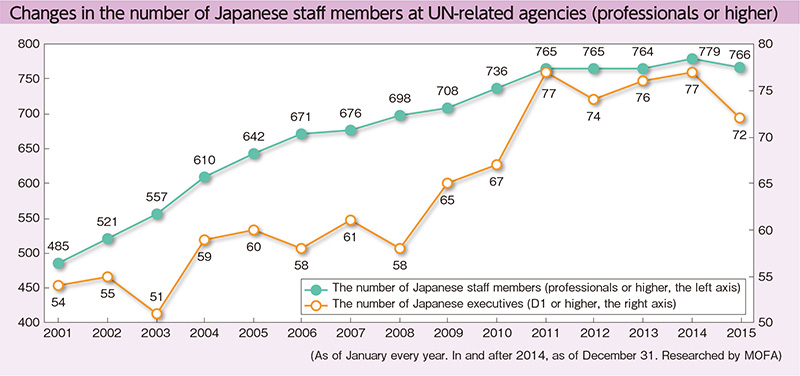
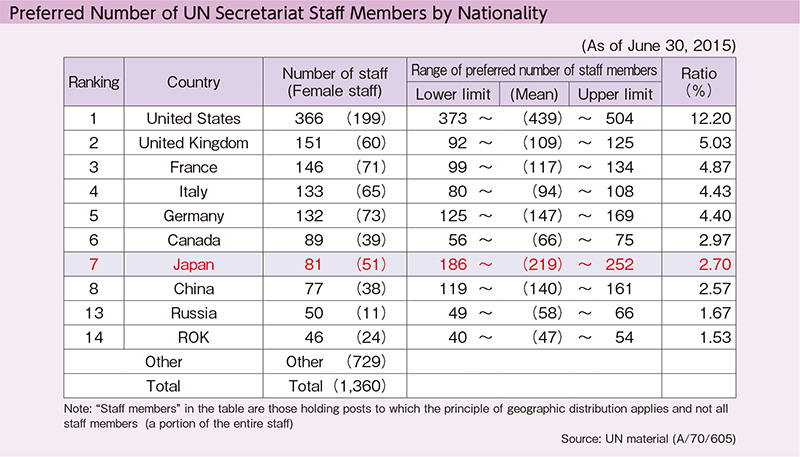
Furthermore, MOFA also supports young people dispatched to international organizations under the Junior Professional Officer Program (a system of sending young Japanese nationals who aspire to work in international organizations as regular employees for two years in principle to give them opportunities to gain necessary knowledge and experience in international organizations and to aim for regular employment after their dispatch). MOFA is also committed to coordination with human resource sections of major international organizations, gathering information, providing vacancy information, and supporting application procedures, etc. for the promotion and employment of Japanese staff.
The year 2016 is a “milestone year” of the 60thanniversary of Japan’s accession to the UN. Japan assumed non-permanent membership on the UN Security Council for a record-high 11th time among UN member state, and will serve a two-year term starting from January 1, 2016. For 60 years, Japan has consistently followed the path of a peace-loving nation and contributed to the international community in terms of finance, policy initiatives and human resources. MOFA, with its knowledge and experience, will continue to work actively so that excellent Japanese nationals, who understand the roles and responsibility of international organizations and have high aspiration and passion to contribute to solving the issues faced by the international community, can take part in international organizations.
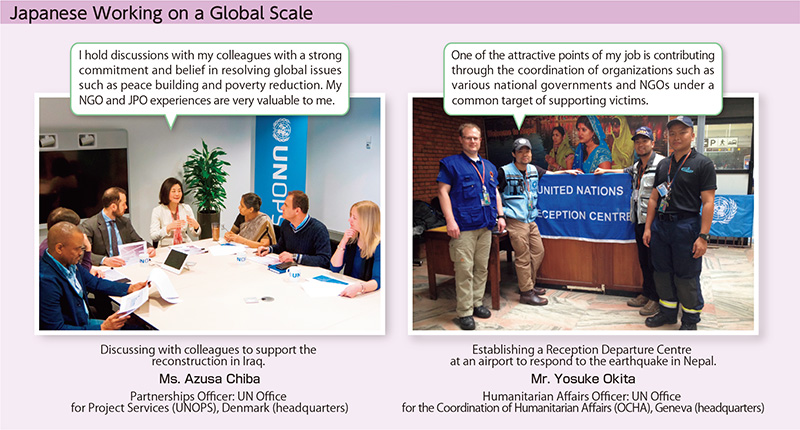
(2) Activities of Non-Governmental Organizations (NGOs)
A. Development Assistance
It is estimated that in Japan there are over 400 non-governmental organizations (NGOs) engaged in international cooperation activities. Most of them are familiar with local needs at the grassroots level and provide flexible and detailed support in developing countries / regions with various challenges such as poverty, natural disaster, and conflicts and their importance in development cooperation is increasing.
MOFA provides financial cooperation in the form of grant assistance for economic and social development projects implemented by Japanese NGOs in developing countries/regions (the Grant Assistance for Japanese NGO Projects) and actively provides Official Development Assistance (ODA) through NGOs. In the FY 2015 (as of end-December), 30 Japanese NGOs implemented 41 Grant Assistance for Japanese NGO Projects in 19 countries and one region in Asia, Africa, and the Middle East, etc. The projects cover a wide range of assistance, including, health/medical/hygienic care (maternal and child health, countermeasures for tuberculosis/HIV/AIDS, water/hygiene, etc.), rural development (environmental development/technological improvement for agriculture), support for the people with disabilities (vocational training/employment assistance, provision of wheelchairs for children, etc.), education (building schools, etc.), disaster risk reduction, and the clearance of landmines and unexploded ordnances (UXO), etc.
The Japan Platform (JPF) was established in 2000, with the aim of conducting emergency humanitarian assistance effectively and promptly through cooperation and partnership among the government, NGOs and business communities at the time of refugee crises/large-scale natural disasters. As of end-December, 47 NGOs are members of JPF. In 2015, besides launches of aid to central Nepal earthquake victims and the program for humanitarian crisis in Yemen, JPF continuously provided assistance to refugees and internally displaced persons in Syria, Iraq, and their neighboring nations. Humanitarian assistance was also provided to Palestine/Gaza, Afghanistan, Pakistan, South Sudan, and Myanmar, etc.
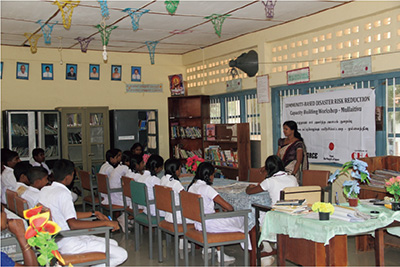 A program to strengthen the ability of disaster risk reduction in the community (Grant Assistance for Japanese NGO Projects: Sri Lanka)
A program to strengthen the ability of disaster risk reduction in the community (Grant Assistance for Japanese NGO Projects: Sri Lanka)(Photo: Civic Force, registered not-for-profit organization)
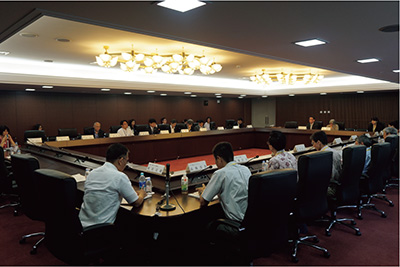 The “general meeting” of NGO-MOFA Regular Consultation Meeting
The “general meeting” of NGO-MOFA Regular Consultation Meeting(FY 2015)
Japanese NGOs conduct a number of activities using contributions from supporters and the income earned from their own business. In recent years, with growing public interest in Corporate Social Responsibility (CSR), an increasing number of companies with technologies and funds implement CSR projects in developing countries in partnership with NGOs with much knowledge on development cooperation.
As seen thus far, NGOs assume important roles in the area of development cooperation. Identifying such NGOs as partners in development cooperation, MOFA and JICA provide indirect support for NGO activities through various policy measures with the aim of enhancing their capacity, enhancing their expertise and developing human resources so that NGOs can strengthen the foundation for their activities and perform further tasks. In 2015, MOFA implemented four projects, namely “NGO Study Group,” “NGO Overseas Study Program,” “NGO Intern Program” and “NGO Consultant Scheme.”
Moreover, the general meeting of the “NGO-MOFA Regular Consultation Meeting” was held in June in order to promote dialogue/coordination with NGOs. Also the ODA Policy Council to discuss overall ODA and the Partnership Promotion Committee to discuss support for NGOs and cooperation measures were held. In addition, MOFA has been working on global-scale issues in the development and humanitarian areas, including the process to adopt the 2030 Agenda for Sustainable Development, exchanging opinions with NGOs.
Diverse Role of UN Staff Former Regional Director for Asia, World Food Programme ●Kenro Oshidari
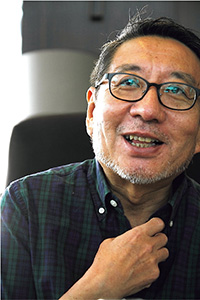
When I entered the United Nations system 35 years ago, our profession “International Civil Service” was not so known in Japan. When I mentioned that I work for the UN back then, people often asked me if I was a translator for those big UN conferences.
Certainly, the UN continues to host numerous meetings seeking political solution to the conflicts of the world that still lingers in the 21st century. However, my UN career was quite different from the scenes in New York as I spent most of my professional life in developing countries, and places requiring urgent humanitarian assistance either because of conflicts or natural disasters. I worked in countries like Bosnia-Herzegovina, Cambodia, Kosovo, Sudan and North Korea providing food assistance through the World Food Programme-WFP. At times, I worked in dangerous environments, but it was always truly rewarding to work with colleagues who share the same passion but coming from variety of countries and regions.
Just in the development and humanitarian field, UN agencies are seeking specialists in areas like health, sanitation, environment, education and disaster preparedness. Furthermore, as in any public or private sector, UN also requires people who have skills in IT, finance, human resource management, procurement and logistics to administratively run the various agencies. There are many opportunities in the UN for people to use their different skills to collectively tackle the global challenges and also to seek their own adventure in the international world.
“Deep-rooted terrorism” and “value of the United Nations”
Senior Legal Officer, UN Counter-Terrorism Committee Executive Directorate (CTED) ●Sue Takasu
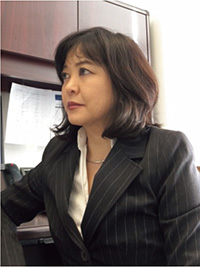
Terrorism continues to remain a huge threat to international peace and security. More than one and a half years have passed since the declaration of the establishment of Islamic State in Syria and Levant (ISIL) in June 2014. It was reported that more than 30,000 foreign terrorist fighters, mostly youth, have been fighting with ISIL in 2015. What makes youth to fight with ISIL which conducts appalling atrocities, and what are mechanisms to cause terrorism? There are so many complicated social factors involved in fermenting conditions conducive to terrorism, and it is not simple to find effective solutions. However, at least, we came to understand that conventional approach such as taken by law enforcement agencies is not enough to suppress terrorism, and we have to pay due attention to holistic and preventive approach such as: promoting understanding and respect of civilization and diversity; enhancing tolerance; securing a chance of self-realization in society; taking appropriate measures against unemployment and poverty; eliminating corruptions; and implementing fair treatment.
Such needs have been affecting the stance of the United Nations. Generally speaking, each UN agency is highly specialized in specific areas with its own mandate and expertise, and works very independently. However, recent terrorism phenomenon requires a holistic approach by almost all UN agencies to bring together all relevant expertise in close coordination and cooperation. This must be an added value of the United Nations, and I believe that dynamism is a beauty of working with the United Nations.
B. Partnership in Other Major Diplomatic Areas
MOFA also cooperates with NGOs in areas other than development cooperation. For instance, at the 59th session of the UN Commission on the Status of Women (CSW) held in March 2015, Ms. Hiroko Hashimoto (professor emeritus of Jumonji University and principal of Jumonji Junior/Senior High School) represented Japan, and NGO representatives actively participated in discussions as members of the Japanese delegation. At the 70th UN General Assembly, Ms. Arino Yaguchi (professor of Tokyo Women’s Medical University) attended the Third Committee, which deals with a range of social and human rights issues, as an advisor to the representatives of the Government of Japan. In addition, the Government of Japan has initiated dialogues with civil society including NGO representatives and experts on matters related to government reports to be submitted based on various conventions on human rights, third country resettlement projects, and the Action Plan on Women, Peace and Security based on the UN Security Council (UNSC) Resolution 1325 and related resolutions.
Japanese NGOs are also increasing their presence in the area of disarmament and MOFA actively promotes cooperation with NGOs. MOFA officials participated in seminars on conventional weapons hosted by NGOs. Cooperation with NGOs is also taken place in the areas of clearance of mines and unexploded ordnances and risk reduction education projects in Afghanistan and other countries.
Furthermore, in the area of nuclear disarmament, MOFA has been conducting dialogues with various NGOs and experts. The Government supports NGOs’ activities to convey atomic bomb survivors’ testimonies on the devastation caused by the use of nuclear weapons to the international community through the commissioned projects called “the Special Communicator for a World without Nuclear Weapons” and “the Youth Communicator for a World without Nuclear Weapons.” As of December 2015, a total of 252 Special Communicators and a total of 107 Youth Communicators have been dispatched to the world through this commission programs.
As for the measures against transnational organized crime, especially in the area of trafficking in persons, coordination with civil society including NGOs is essential. With this in mind, the government actively exchanges opinions with NGOs and other stakeholders to identify recent trends of trafficking in persons and to consult appropriate measures to address them.
(3) Japan Overseas Cooperation Volunteers (JOCV) Celebrating its 50th Anniversary and Senior Volunteers (SV)
The Japan Overseas Cooperation Volunteers (JOCV) is a Japan International Cooperation Agency (JICA) program aimed at cooperation/assistance for the economic and social development at the communities of the developing countries while young skilled people aged 20 to 39 live and work together with local people in these countries and fostering mutual understanding. As of end-November 2015, 40,977 JOCVs had been dispatched to 88 countries in total. Dispatched members have been engaged in about 200 types of work in nine areas: planning administration, commercial/tourism, public utility works, human resources, agriculture, forestry and fisheries, health/medical care, mining, social welfare and energy.
On November 17, 2015, JICA held a ceremony to mark the 50th anniversary of JOCV, which was established in 1965. The ceremony was attended by Their Majesties the Emperor and Empress. The ceremony included a video message from Prime Minister Thongsing Thammavong of the Lao people’s Democratic Republic and a congratulatory message from His Majesty Jigme Khesar Namgyel Wangchuck, the King of Bhutan. Related events were held in recipient countries. The JOCV program is highly evaluated by developing countries as the “Visibility of Japanese Aid.” Moreover, from October 4 to 7, 2015, JICA hosted the Conference of International Volunteer Cooperation Organization, which was attended by international organizations, volunteer groups, NGOs, universities and companies involved in volunteers from all around the world.
In 2015, in addition to countries where JOCVs had been dispatched, Japan concluded with Swaziland an agreement concerning the dispatch of volunteers under the JOCV program and resumed the dispatch of JOCVs to Madagascar.
The Senior Volunteers (SV) program is a program to dispatch middle aged persons from 40 to 69 years of age who have wide-ranging skills and rich experiences to developing countries. The program has been expanding every year since its foundation in 1990 and by the end of November 2014, a total of 5,833 volunteers had been dispatched to 73 countries, and cooperation in nine areas, the same as the JOCV program, had been implemented. The SV program has drawn increasing interest in recent years from the perspective of supporting to start a new life after retirement and utilizing the rich experiences and expertise of retired senior citizens.
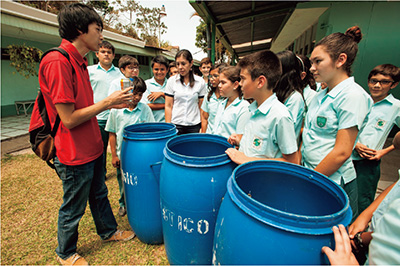 A volunteer from the Japan Overseas Cooperation Volunteers (JOCV) giving a lecture on environmental education in Costa Rica
A volunteer from the Japan Overseas Cooperation Volunteers (JOCV) giving a lecture on environmental education in Costa Rica(Photo: Kenshiro Imamura/JICA)
JOCV and SV programs are supported by the high aspirations of people who are keen to provide cooperation for the sake of economic and social development and reconstruction of developing countries. MOFA actively promotes these programs, considering them as a core of participatory international cooperation by citizens. As of end-November 2015, 2,114 JOCVs and 442 SVs are working around the world (71 countries and 59 countries, respectively). The volunteer participants who have returned to Japan contribute their experience to Japanese society by sharing their experiences in educational and local activity settings and private companies. These unique participatory activities of Japan are highly appreciated and expected both domestically and internationally, including in recipient countries.
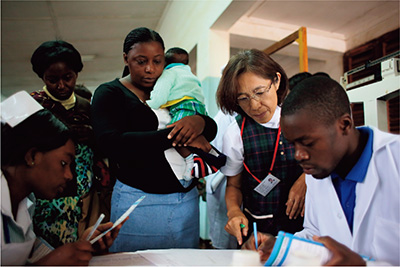 A member from the Senior Volunteers (SV) working as nurses at a maternal and child health center in Zambia
A member from the Senior Volunteers (SV) working as nurses at a maternal and child health center in Zambia(Photo: Atsushi Shibuya/ JICA)
Experiences gained from JOCV/SV programs can lead to personal development of their participants as human resources who will make a positive impact on the global arena. Thus, the government is working with companies, municipal governments and universities which need such opportunities to develop human resources, in order to expand the participants through the dispatch of their employees, teachers and students to developing countries. For instance, as a program responding to the needs of private companies, such as small-and medium-sized enterprises, aiming for international development of their businesses, the government launched the “Private-Sector Partnership Volunteer” program in FY2012. Furthermore, the government is committed to developing an environment for the feedback of the experience of the returned JOCVs and SVs to society, for example, by providing career support to them. Returned volunteers are active in many fields inside and outside Japan. Some have been hired by the Reconstruction Agency to work as additional personnel for disaster-stricken local governments, utilizing their own specialties and experience gained in JOCV/SV programs. Others keep supporting the countries they were dispatched with other returned volunteers, or work for international organizations.

